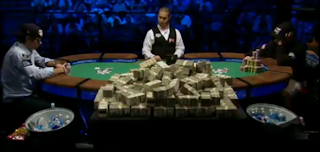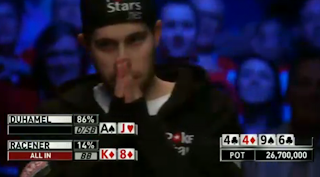2010 WSOP Main Event Final Table: Limping to the Finish
 Last night, Jonathan Duhamel became the first Canadian to win the World Series of Poker Main Event, finishing off the short-stacked John Racener of Florida in just 43 hands to claim the bracelet and the $8,944,310 that went with it.
Last night, Jonathan Duhamel became the first Canadian to win the World Series of Poker Main Event, finishing off the short-stacked John Racener of Florida in just 43 hands to claim the bracelet and the $8,944,310 that went with it.Was a little anticlimactic last night. Seemed destined to be that way, given that Duhamel started with 86% of the chips, and thus Racener needed a quick double-up or two for the pair to be able to engage in a “fair” fight.
Was searching around some more after my post yesterday about heads-up play at the WSOP ME. Statistics get fuzzy prior to 2000, but it looked as though the last time a player was down this much heads-up and came back to win was 1991. Don Holt apparently had a huge lead on Brad Daugherty -- I have seen it referred to as a “10-to-1” advantage as well as 1.9 million to 250,000 -- before Daugherty came back to win.
On Saturday, Racener had frequently demonstrated passive play throughout the day and night, a strategy which ultimately -- thanks in part to the way the cards fell and the approaches chosen by some of the other players -- served him well enough to allow him to sneak into the final two.
It wasn’t that surprising, then, to see Racener continue in that same, non-aggressive vein last night, given his short-stacked status. That said, it was a little unexpected to see Racener “turtle up” to the extent that he did. At times it almost seemed like he was nursing a short stack on the cash bubble or something, only he couldn’t fold his way into any more cash here.
He had little room to maneuver, of course.
For the first 10 hands last night the blinds were 600,000/1,200,000, though with a 200,000-chip ante on top that we might just think of it as 800K/1.4 million. Racener hovered around his starting stack of 30 million for that entire stretch, so in essence he was a shade above the 20 big blind range for most of those initial hands.
On the 11th hand of heads-up play the blinds moved to 800,000/1,600,000, again with a 200,000 ante. Soon Racener dipped below the 20 BB range, reducing his options even further. His stack continued to dwindle, and by the very end he was down to less than 15 million (to Duhamel’s 200 million-plus).
Looking over the 43 hands, it wasn’t until Hand #30 -- the 15th time Racener had the button -- that the Floridian opened with a raise. The first 14 times he either limped (12 times) or open-folded (twice). Meanwhile, Duhamel was mostly opening with standard raises with his big stack, doing so 13 of those first 15 times he had the button.
Interestingly, that first time Racener did finally open with a raise, Duhamel responded with an all-in reraise, and Racener let it go. Following that one, both players either limped or folded their buttons for the next eight hands.
 Then came a short sequence of uncalled, all-in shoves from both players. Finally, Racener called Duhamel’s all-in raise on Hand #43 and his
Then came a short sequence of uncalled, all-in shoves from both players. Finally, Racener called Duhamel’s all-in raise on Hand #43 and his 
 failed to catch up to the Canadian’s
failed to catch up to the Canadian’s 
 .
.In the end, then, Racener had the button 21 times last night, and only opened with a raise twice -- once on that Hand #30, then again when he pushed all in and didn’t get a call on the penultimate Hand #42.
Racener was obviously in a tight spot, and it’s hard to be too critical given the way his short stack limited his options. With 15-20 big blinds, he couldn’t really mess around with standard preflop raises that much, as doing so wouldn’t leave him with enough to continuation bet unless it were to push all in.
The issue is mostly academic, anyway. Racener’s chip disadvantage was so large, it was probably the case that any strategy he chose was more likely than not to fail. Still, would’ve been nice to see a bit more fight in last night’s battle.
Will be watching ESPN’s rapidly-packaged highlight show tonight, for sure. Last year a total of 32 out of the 364 final table hands were shown, with the program lasting about two-and-a-half hours. Here’s a rundown of all 32 hands shown, by the way.
I imagine they’ll be allotted a similar amount of time for the show tonight, so we’re probably going to see around 30 of the hands played. Will be most interested, of course, in those hands without showdowns, in which we didn’t learn of players’ holdings when following the action. (Then again, now that I think about it, those are precisely the hands that are less likely to be featured tonight!)
I still can’t bring myself to get fully behind the whole final table delay ideer, I’m afraid. Has been a lot of fun, once again, to relive the July portion of the WSOP ME story over the last few months, and Saturday’s action did provide a lot of entertainment. But even though the “narrative” has been well-constructed once again, I think it is now set up in such a way that the ending is always likely to prove at least somewhat anticlimactic.
In other words, you might say Racener wasn’t the only one limping last night. Everybody was.
Labels: *high society, 2010 WSOP, ESPN, John Racener, Jonathan Duhamel














1 Comments:
I wonder if ESPN would ever consider making some sort of package available that would include all of the final table hands including the hole card information? I would probably pay a couple of bucks to see that just because I'm so curious what Cheong was raising with all those times. (We could do without Hellmuth's commentary where he continually interrupted Adam Schoenfeld every time he tried to make a point though.)
Post a Comment
<< Home